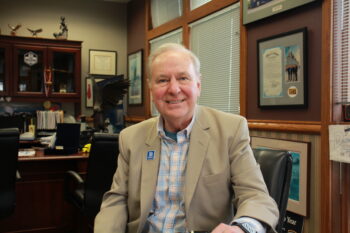
DMACC President Robert Denson. Photo by Kennedy Ballinger
DMACC’s President Robert Denson was a trial attorney for 16 years before shifting careers. In a sit-down interview, I got to ask him some questions about his law career, and what advice he would give to aspiring law students. Here is the interview:
Note: This interview has been edited for length and clarity.
Could you give me a little bit of background about what it was like being an attorney?
Denson: Sure. I was working for the University of Florida in charge of leadership orientation and discipline. So I went to law school part-time while I was going to work full-time. Then when I graduated from law school, I went to work for the University attorney’s office doing patent licensing. There were a lot of other administrative law-type things, but primarily, I did patent licensing with the university’s technology. I did that for two years. Then I went to work for a local law firm doing plaintiff’s personal injury work. And then a year later, I opened up my own practice. And basically, I represented people that were hurt in accidents. I did a fair amount of farm litigation. Farmers that had gotten ripped off by somebody, but most of those people who had been hurt in some kind of an accident, were there. I did that for 16 years.
Was there anything that made you specifically want to choose that type of law practice?
Denson: I went to law school not wanting to practice that kind of law. But again, you don’t know what you don’t know. But while I was working I got recruited by a personal injury trial firm in Gainesville, Florida, where we were living, and started working for them. I really liked it because I liked the clients I was representing. I mean, they are just people who did not want to be in an accident, but they got hurt. They weren’t being treated fairly by the insurance company, whatever. So it really was fun, fast-moving. And I got to learn a lot of different areas and every case had interesting attributes. And a lot of it is just how much time you are willing to spend.
I watched a representative, another lawyer’s mother, who was a teacher, get fired from her school. And they said it was because of financial reasons, so I asked to see all their files. And I went into a room about three times as big full of file cabinets. We didn’t have computers. And I mean, I spent several days before I found documents that prove that they were not telling the truth. That, you know, at the same time, they’re telling her they don’t have money. There, their accountant had just given them a record about how well off they were. I mean, that’s just fun stuff.
I represented two women in child custody cases, I did not do divorce. I did two cases but I hated them. Because one side would always put the kids in play, and I just didn’t like it. But I did like representing women whose husbands quit paying child support, you know, so I got into the husband’s records and found out they were moving all this money around. And I mean, the judges hated that too. I never lost one of those because everybody wants to do the right thing by whatever parent has children.
What was your favorite type of case to take on?
Denson: I probably like worker’s compensation the best. It is an easier, more relaxed brand of law. The judge in a normal court case doesn’t care. I mean, he or she just wants a fair result. But in a work comp case, the judges really are pretty much on the injured person’s side, making sure they get their medical bills paid, they get their right amount of workers comp wages, etc.
So that was fun because you really became a partner with the judge. Wanting to do the right thing doesn’t mean I always won, but I hardly ever lost because again, plaintiff lawyers, they talked about frivolous cases. Plaintiff’s lawyers don’t take cases that are frivolous, and you can’t because you know, most of the time it’s the lawyers’ money that’s paying for the entire case. Yeah, if you don’t win, you don’t get, you don’t even get your money back. So you couldn’t afford to take a case that didn’t have pretty good merit. So I like workers comp.
I don’t think I ever had a client I didn’t like because, you know, if you didn’t have a good relationship with your client, you’d send them down the road because it wasn’t going to work out because, again, all the money that’s paid for that case is my money until the end. But I really like the helping aspect of it.
It sounds like you did a variety of cases and just a variety of work in general, what specific law degree did you get?
Denson: Just a regular I mean, it’s, it’s just the Juris Doctor. No, but I did medical malpractice, I did construction litigation, I represented a dairy farmer who had gotten a bad deal with a company that provided the milk to him for his calves. A lot of workers comp united two divorces hated both, you know, and a few child custody cases.
You mentioned medical malpractice, that’s something I’m looking into myself, what was that like for you?
Denson: Very expensive to do. But again, somebody got hurt. It’s some kind of a medical procedure. Really, all the cases are basically the same, you’ve got to prove negligence in some way or another. So you hire an expert, you’re taking lots of depositions. It’s high stakes, you know, and they’re talking to you about limiting liability.
It’s a big deal in a lot of states, and medical malpractice reform. Well, I represented several doctors, who had malpractice in their families, and they didn’t want to limit damages. I mean, nobody intentionally wants to hurt anybody else. And most people, if you hurt someone, you’ve probably got insurance. And you really want to make it as right as you can. Because I think most people are very, very good. I run into very, very few bad people in my life.
What was something that made you want to become a lawyer?
Denson: Actually, back then I was, you know, I worked for Iowa State, I worked for the University of Florida. In order to move up in that business, you have to keep moving every few years. And I wanted to have a small town desk law practice, where I represent real estate and those kinds of things, just a small business.
So that’s where it started. And even when I went to law school, I didn’t really understand personal injury litigation. I just happened to have an opportunity that came up. But, you know, I just really wanted to have my own business. I probably wanted to come back to Iowa since Pat and I are both from Iowa and just opened up a small-town practice. I mean, never got to that point. But you know, I’ve always had good opportunities.
What was owning your own practice Like?
Denson: Very, very gratifying. I had two lawyers working under me and a couple of secretaries. I paid them extremely well. And we were a big team. So I had my own building in Gainesville, Florida for 16 years. It was a lot of work, but everything was managed and I had accountants working for us. It was good. Good. Probably not, not unlike any other business owner.
What was your biggest takeaway from that experience?
Denson: Work hard. The secret of life is hard work. And, you know, again, I think you have to take care of your people, and everybody works hard and you have to be responsive. I really was happy when all this technology came along, you know, the computers, databases, you know, I had developed my own database for tracking clients. I mean, it’s really saved a lot of time. And I had a lot of clients, but I was in court a lot. So it was a pretty hectic operation.
What was being in the actual courtroom? Could you tell me a bit more about the environment?
Denson: It was stressful but enjoyable. You know, and it’s like getting up to give a speech, because, you know, you’re doing opening arguments, you’re picking the jury or questioning witnesses. It was like, kind of a battle, because, you know what information you want to get out of the witness, but many times the witness didn’t want to tell you that. And you’ve already taken their deposition.
You would just be on pins and needles the whole time because things are going to go south very quickly. And then you got six jurors sitting there watching you. So you have to make sure that you present the case in a way that they understand.
I actually served on one jury, it was a criminal case. I just wanted to experience it. I was unbelievably impressed by how hard the jury worked. Everybody on that jury wanted to do the right thing. It was fun. I learned a lot about being a trial lawyer, but by looking at and experiencing what juries go through. You know, a lot of lawyers never see the inside of a courtroom.
Now if you become a lawyer, you need to practice law. I see too many people coming out of law school and immediately going into work for politics or something or as a lobbyist, whatever. Go to law school or actually get a job and practice law for a while that will perfect your craft.
What was the most rewarding case you took on? Either for whoever you were taking it on for or for yourself?
Denson: Well, it’s two different things. I think the case where I was representing the couple and the Arizona baby, yeah, that was probably the most rewarding, and also the child support cases, whatever it is that women with their husbands quit paying that those are to me, you just feel unbelievably good and judges feel good. So that went very well.
I also had a $3 million verdict, which was the largest verdict I had and that was a dairy farmer that I mentioned earlier. He came up with a way to raise veal calves. The industry was raising them in pretty dark barns tied, in a small crate, seemingly very inhumane. And there was a conspiracy to run him out of business which the feed company did. So I represented a man in that case that we got a $3 million verdict, that was my biggest verdict.
So how did becoming a lawyer shape who you are today?
Denson: I think the main thing is because of the litigation cases that I had, I have a fairly good sixth sense for issues that could arise. Doesn’t mean I’m that smart, but I just saw enough of it.
So I’m going to shift gears a little bit and talk about your law school experience. I just want to know, kind of your perspective, what was it like?
Denson: What my law professor told me on the first day of class is that it is an endurance contest. Yes, clearly, you have to study hard, you have to read a lot of material, you have to pay attention. But it’s, you know, like any other subject matter. It just takes time to learn it. And you really have no, you know, you don’t have any choice. But it’s a decent process, but it’s no different and probably going to med school. It’s just, you gotta get through.
And then my last question is, what advice do you have for students who want to become a lawyer?
Denson: I would say, if you could, job shadow, and or work in a law office for a summer or something. A part-time job is just to get number one to get to know the gizmo lawyers, but also really experience what they do. Because I mean, you’d see you’d quickly learn how to do some research and develop that interest in it. Yeah. But I think that would be the don’t watch lawyer shows. Yeah, I would not worry about that. But, you know, just try to work for a law firm for a little bit. If you don’t have to work, don’t work because law school is full-time.





Comments